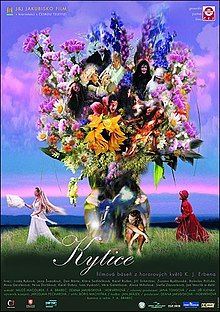Wild Flowers (2000 film)
This article has multiple issues. Please help improve it or discuss these issues on the talk page. (Learn how and when to remove these messages)
|
| Kytice Wild Flowers | |
|---|---|
 | |
| Directed by | F. A. Brabec |
| Written by | F. A. Brabec Miloš Macourek Deana Jakubisková-Horváthová |
| Based on | Kytice by Karel Jaromír Erben |
| Produced by | Deana Jakubisková-Horváthová |
| Cinematography | F. A. Brabec |
| Edited by | Boris Machytka |
| Music by | Jan Jirásek |
| Distributed by | Bontonfilm |
Release date |
|
Running time | 81 minutes |
| Country | Czech Republic |
| Language | Czech |
Wild Flowers (Czech: Kytice) is a Czech drama film released in 2000. It was directed by F. A. Brabec and based on seven poems from Kytice, a collection of ballads by Karel Jaromír Erben. While relatively successful commercially, the film was deplored by critics for its crude literalism of depiction.
Structure
[edit]The 7 stories are as follows:
- Kytice (Wild Flowers)
- Vodník (The Waterman, or The Water Goblin)
- Svatební košile (Wedding Shirts, or The Specter's Bride)
- Polednice (The Noon Witch)
- Zlatý kolovrat (The Golden Spinning Wheel)
- Dceřina kletba (The Daughter's Curse)
- Štědrý den (Christmas Eve)
Plot
[edit]A Film Story playing from spring to winter and covering 80 years of human life. Seven dramatic human life stories that may play anywhere and in any century. They tell the everlasting story of passion, love desire, obsession and selfishness.
The whole story, the Ballads were written by Czech poet Karel Jaromír Erben a century ago and yet they are still here and alive. Therefore, the authors of the movie decided to choose seven of the ballads and make them a film poetry of a very new style. It is a composition of photography, music and fascinating landscape and architecture.
The first ballad – Wild Flowers - is full of emotions and opens the whole world of different feelings and emotions of the human being as well as fairy tale creatures. It carries the name Bouquet and tells a story of little orphans crying for their mother . The mother hears their cries and prayers and comes back to them in the form of a little flower.
The Waterman is a fascinating slightly horror story about a waterman who falls in love with a country girl. Most of the scenes are shot really in the water and make this very authentic. It is again an eternal story about love, passion, different aspects of motherhood and discrimination.
The Noon-Day witch is tells of a desperate, tired mother and a greedy old noon witch. The mother is frustrated when her child is noisy and bothering her in every respect, therefore she calls the witch to give the boy a lesson - however she regrets her desperate deed immediately, its consequences are irretrievable.
The Wedding Dress is a romantic horror played between our world and the world of the dead.
The Daughter's Curse is in fact an unfortunate misunderstanding between two different generations. It deals again of the often complicated mother-daughter relationship, especially when the daughter is handicapped and the mother wants “the best” for the poor child. In the end the daughter cannot cope with the freedom and curses her mother.
The Golden Spinning Wheel is a colourful story about the confusing similarity of faces when characters are totally different. It is a great opportunity for one actress who plays both the good and the wicked girl. However the bad ones get punished and the good ones are rewarded as in any good fairy tale. The photography uses the beautiful colours of the fall and the beauty of the landscape.
The last ballad The Christmas Day is closing the circle of a human life in the person of an old woman who accepts her death as a natural ending of her life. She feels in peace with God and her fellow people and knows that she didn't live in vain.
The persons of individual stories keep meeting in between their ballads as on a merry-go round. It is a great poetry composed of pictures, music and words that accompanies us home and makes us ponder over the sense of life and death, love and hate, tolerance and discrimination, tenderness and wild passion for a long time.
Film awards
[edit]- Czech Lion awards 2000
• Best Photography
• Best Music
• Best Sound Editing
• Best Poster - Rhode Island International Film Festival 2002
• Grand prize for best foreign film - Wine Country Film Festival 2001
• Best photography - Camerimage 2001
• Winner of World Panorama - Audience Competition
